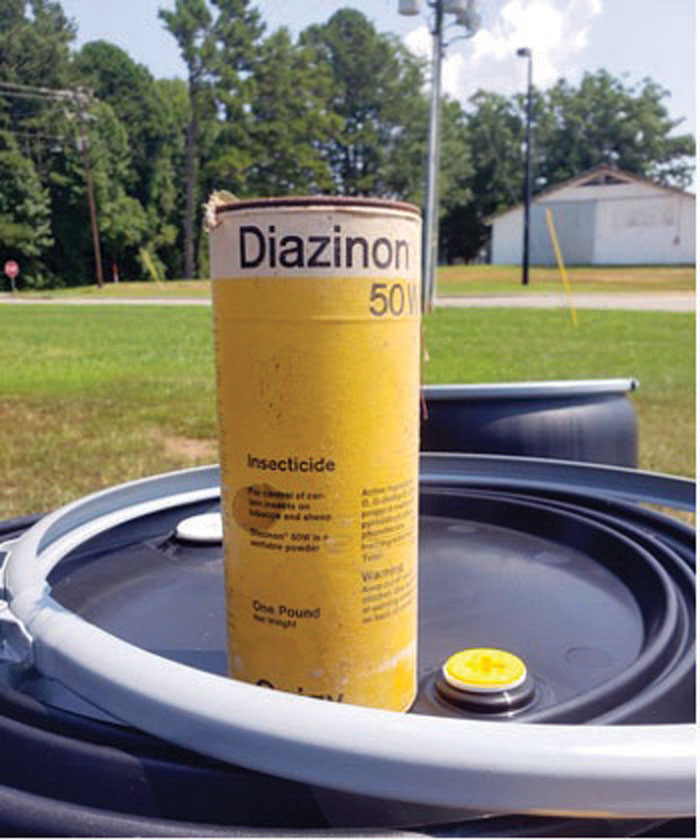AmyLynn Albertson: Rain barrels and recycling
Published 12:00 am Saturday, September 16, 2023

- Make sure you bring your unwanted pesticides to the Special Waste and Recycling Day on Oct. 11, 8 a.m.-5 p.m. Rowan County Recycling and Processing Center 1102 N. Long Street Extension East Spencer
By Amy-Lynn Albertson
N.C. Cooperative Extension
It’s Creek Week in Rowan County this week. We are having a Rain Harvesting Workshop at the Extension office on Tuesday, Sept. 19, at 1 p.m. A rainwater harvesting system captures stormwater runoff, often from a rooftop, and stores water for later use.
Rainwater can be used for irrigation, car washing and flushing toilets. With special treatment and plumbing, it is even possible for harvested rainwater to be used as the primary water source for a home or business.
These systems can reduce water bills and improve the environment by capturing nutrients and other pollutants from the rooftop runoff. A rainwater harvesting system has four main components: the cistern that stores the water for later use; the gutter system that collects runoff from the roof, directing it into the cistern; overflow pipe that allows excess runoff to leave the cistern in a controlled manner; the outlet pipe that draws water from the bottom of the cistern for use.
Cisterns can be constructed from various materials, such as plastic, fiberglass or galvanized metal. Plastic cisterns are generally less expensive and don’t require assembly. The color of the cistern is vital for plastic tanks. Clear or light-colored plastics may permit algae growth inside the cistern. Plastic tanks are relatively easy to paint or decorate. Check with your local paint store for paint that will adhere long-term to the plastic. Rain barrels are a less expensive alternative to large rainwater harvesting systems and can be used to meet small outdoor water demands. A rain barrel is usually made from a 55-gallon barrel and has the same main components as an extensive rainwater harvesting system.
Go to http://go.ncsu.edu/rowanrainbarrel to register for the workshop and learn all about rain harvesting with Extension experts and Happy Roots.
In Honor Creek week, we should go through our sheds, barns and garages and gather our old expired fertilizers, herbicides and pesticides together. Our annual Household Hazardous Waste and Pesticide Disposal Collection Day will be Oct. 11 from 8 a.m. to 5 p.m. at the Rowan County Recycling and Processing Center at 1102 N. Long Street Extension, East Spencer.
Anytime your fertilizer has gotten wet, it is no longer effective and should be disposed of properly. Before using any pesticide, it is essential to read the entire product label. The label has important safety instructions to protect the applicator before, during and after pesticide use. Directions for household pesticide waste disposal can vary widely from product to product. Take special care to read each product’s instructions to dispose of pesticide waste properly. Failure to do so can create severe user and environmental hazards.
Any labeled pesticide products, whether insecticide, herbicide, rodenticide or fungicide, will be accepted. These pesticides are containerized, weighed and loaded into a transport vehicle. The materials are transported out-of-state for incineration. This waste recycling event will also be accepting prescription and non-prescription medications, tires (limit 5 — no rims), fire extinguishers, helium tanks, oxygen tanks, propane tanks, all computer equipment, cell phones, all electronics (anything with a plug), fertilizers, automotive fluids, thermometers, thermostats, fluorescent bulbs, washers, dryer, refrigerators, eyeglasses, hearing aids, toner cartridges and household cleaning products. For recycling or pesticide management information, contact the Rowan County Extension Center at 704-216-8970 or on the web at http://rowan.ces.ncsu.edu.
Amy-Lynn Albertson is director of the Rowan County Extension.






